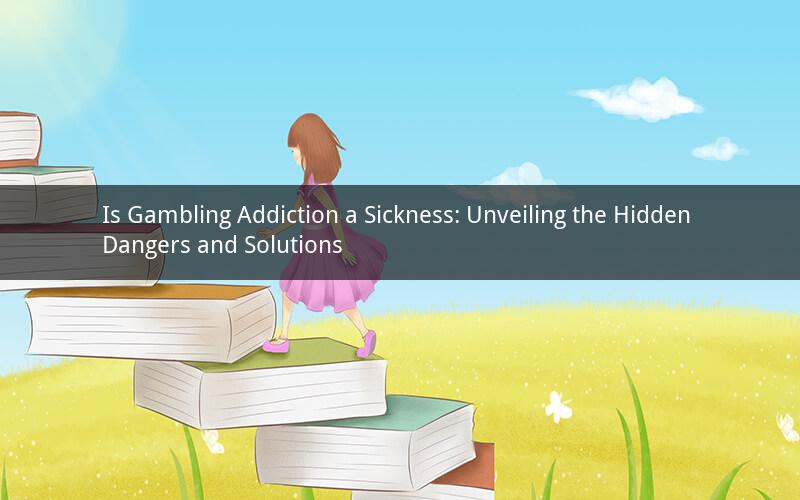
Introduction:
Gambling addiction has been a topic of intense debate among researchers, psychologists, and the general public. Some argue that it is a sickness, while others believe it is a mere personal weakness. This article delves into the various perspectives surrounding this debate, highlighting the signs, consequences, and potential solutions to gambling addiction.
1. Understanding Gambling Addiction:
Gambling addiction, also known as compulsive gambling, is characterized by an irresistible urge to gamble despite negative consequences. It is a complex condition that affects both the mind and the body. Many individuals who struggle with gambling addiction find it challenging to control their urge to gamble, leading to significant financial, emotional, and social problems.
2. Signs of Gambling Addiction:
Identifying gambling addiction can be challenging, as it often manifests in subtle ways. Here are some common signs to look out for:
a. Preoccupation with gambling: The individual constantly thinks about gambling, planning their next bet or reliving past gambling experiences.
b. Loss of control: Despite efforts to stop, the individual struggles to control their gambling behavior, often leading to escalating stakes and time spent on gambling activities.
c. Financial problems: Gambling addiction can lead to significant financial difficulties, including debt, loss of savings, and inability to meet financial obligations.
d. Emotional and psychological distress: Individuals with gambling addiction may experience feelings of guilt, shame, anxiety, and depression.
e. Relationship problems: Gambling addiction can strain relationships with family, friends, and loved ones, leading to conflicts and isolation.
3. The Debate: Is Gambling Addiction a Sickness?
The question of whether gambling addiction is a sickness has sparked a heated debate among experts. Here are some arguments from both sides:
a. Proponents of gambling addiction as a sickness:
- Many psychologists and researchers argue that gambling addiction is a mental illness, similar to other addictive disorders such as alcoholism and drug addiction.
- They emphasize the biological and psychological factors that contribute to the development and progression of gambling addiction, such as brain chemistry imbalances and genetic predisposition.
- They highlight the negative consequences of gambling addiction, including physical health issues, mental health problems, and social dysfunction.
b. Opponents of gambling addiction as a sickness:
- Some argue that gambling addiction is a personal choice and a lack of self-control, rather than a genuine illness.
- They believe that individuals have the power to control their gambling behavior and should take responsibility for their actions.
- They suggest that labeling gambling addiction as a sickness may lead to a sense of victimhood and reduce personal accountability.
4. Consequences of Gambling Addiction:
Gambling addiction can have severe consequences, impacting various aspects of an individual's life:
a. Financial consequences: Individuals with gambling addiction often face significant financial difficulties, including debt, bankruptcy, and loss of assets.
b. Emotional and psychological consequences: The emotional toll of gambling addiction can lead to depression, anxiety, and other mental health issues.
c. Social consequences: Relationships with family, friends, and colleagues can suffer due to the negative consequences of gambling addiction, leading to isolation and social withdrawal.
d. Legal consequences: In some cases, gambling addiction can lead to illegal activities, such as theft or fraud, to fund gambling habits.
5. Solutions to Gambling Addiction:
Treating gambling addiction requires a comprehensive approach that addresses the underlying causes and consequences. Here are some potential solutions:
a. Therapy: Cognitive-behavioral therapy (CBT) has been found to be effective in treating gambling addiction. It helps individuals identify and change negative thought patterns and behaviors associated with gambling.
b. Support groups: Joining a support group, such as Gamblers Anonymous, can provide individuals with a sense of community and support from others who have experienced similar challenges.
c. Financial management: Learning and implementing effective financial management strategies can help individuals regain control over their finances and avoid further financial distress.
d. Treatment programs: Residential or outpatient treatment programs can provide individuals with a structured environment to address their gambling addiction and develop coping skills.
6. Conclusion:
The debate over whether gambling addiction is a sickness continues to evolve. While some argue that it is a personal choice and a lack of self-control, others believe it is a genuine mental illness with significant consequences. Regardless of the debate, it is crucial to recognize the signs of gambling addiction and seek help if necessary. With the right support and treatment, individuals with gambling addiction can overcome their struggles and lead healthier, more fulfilling lives.
Questions and Answers:
1. What are the common signs of gambling addiction?
Answer: Common signs of gambling addiction include preoccupation with gambling, loss of control, financial problems, emotional and psychological distress, and relationship problems.
2. Can gambling addiction be treated?
Answer: Yes, gambling addiction can be treated. Effective treatments include therapy, support groups, financial management strategies, and treatment programs.
3. Is there a genetic predisposition to gambling addiction?
Answer: Yes, research suggests that there may be a genetic predisposition to gambling addiction. Certain genetic factors can contribute to the development and progression of the condition.
4. How can I help a loved one with gambling addiction?
Answer: You can help a loved one with gambling addiction by offering support, encouraging them to seek professional help, and being patient and understanding throughout their journey.
5. Can gambling addiction lead to legal consequences?
Answer: Yes, in some cases, gambling addiction can lead to legal consequences, such as theft or fraud, to fund gambling habits. It is essential to address the underlying addiction to prevent further legal issues.